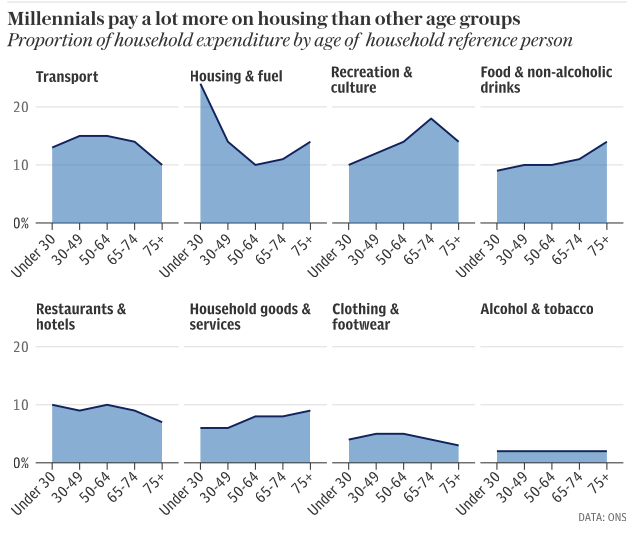I rarely blog about matters unconnected with EARSC and the EO sector but this one is an exception based on personal views.
I came across this chart recently. It comes from a report looking at intergenerational wealth produced by the UK Resolution Foundation which is chaired by David Willets - former Research Minister who was largely responsible for initiating the strong space investment in the UK (but this is the only connection with the space sector).
The chart shows the household expenditure across the generations. What stands out is the very large difference for the proportion of income spent on housing. Indeed, whereas for my generation (the baby boomers) at age 30 around 40% of us owned our own house, today (for the millennials) it is less than 20%. Overall home ownership has dropped from 72.5% to 63.4% over the last 10 years (source tradingeconomics.com). Other statistics show that, for the generation under 30 today by the time they are 40, they will spend 64 hours more per year in commuting than we did at the same age. That is nearly 2 working weeks just travelling to and from work and less time spent with their families. |
The report concludes that facing significant deficits in health spending in the UK the traditional approach of asking the next generation to pay for the former just cannot work. Already, the millennials are less able to buy into home ownership, cannot afford to set aside enough for their own old-age and yet are facing the prospect of higher taxes to pay for my generation. This cannot work. The UK is not alone in this situation, it is faced by most developed countries to a greater or lesser degree.
I grew-up in a golden age without i-phones, computer games, cheap flights to weekend destinations and many other consumer goods, but whilst making life more agreeable they are not basic needs according to Maslow’s pyramid. We had home ownership, final benefit pension schemes and a free at source health-care system – and scientific progress means that we live much longer. My generation decided upon a social model which is not sustainable and which is leading to greater inequality between the have’s and have not’s.
It will be unpopular amongst the older generations and especially pensioners, but somehow and by some means we shall be forced to pay for this Ponzi scheme of expectations stemming from, us, the baby boomers.
I add just one further observation, that it is the pace of change which is causing the majority of problems. Given time we can adapt. Some individuals adapt faster than others (and can benefit from the confusion if their judgements are accurate), but as a whole, society needs time to accept change. If I look at the UK at the moment, the “ruling class” as represented by the current government are completely out of touch with the real situation facing the country. The lunatics are in control of the mad-house and Brexit is headed straight for the rocks. Where are the leaders who can get to grips with the coming crisis hoping that they are not like those in the Handmaid’s Tale[1].
[1] The Handmaids Tale is a book by Margaret Attwood, recently realised as a TV series currently entering its second season. It describes a dysfunctional future where women are objects and the ruling class are religious fanatics. All freedoms are lost except for the hypocritic ruling class.


This page has no comments.